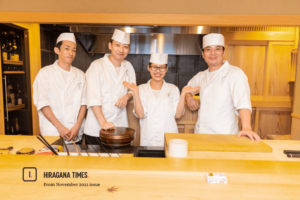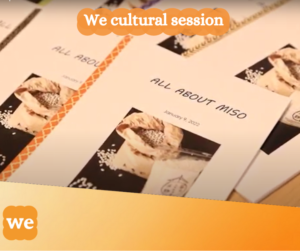
Are you thinking about starting to learn the Japanese language? We can help you!
At We Languages, you can try our renewed Dōjō Lessons: each week, Dojo coaches prepare a new topic for discussion and classroom activities. You can participate in it and learn different aspects of Japanese culture and... It's a trial!
But let's discuss it with one of our coaches, Hibikana Nogami.
What Is a Dōjō Lesson?
The concept of Dōjō lessons was originally made for new coaches to improve their teaching skills. They could get experience with different kinds of students and their different needs. Now, there are a lot of experienced coaches with different skills who can teach about various topics. Dōjō lessons are not only a training opportunity for coaches but also for students.
What Does The Word “Dōjō” Mean?
Dōjō (道場・どうじょう) means "training hall". It's the hall where you practice martial arts, like Karate or Judo. As you can guess, Dōjō lessons are meant to practice the Japanese language as athletes practice their sport. It's like a trial: can you get this challenge?
What Can I Learn In a Dōjō Lesson?
As mentioned, our experienced coaches have different bits of knowledge. Our Dōjō Lessons prepare for you a specialized session, each with a different topic. Here are some examples: Japanese healthy food, Chat like a Nihonjin, Anime discovering channel, Japanese onomatopoeias, Secret of Onsen... And so much more!
You can learn buzzwords and the cultural aspects of Japan as well. This is also a good challenge for experienced coaches to teach not only language but also culture, hobbies, and their knowledge or specialty.
We want our students to find and learn something NEW about Japan from this Dojo.
How Can Dōjō Lessons Help Students Learning Japanese Language?
In our Dōjō Lessons, students can choose between different topics and learn about it by practicing Japanese. Of course, topics are about various aspects of Japanese culture.
I think learning a language is the same as learning a culture. The more you are interested in culture, the more you learn the words and phrases. For example, Manga and Anime are popular things in Japan. If you want to learn the Japanese language, you can't miss that. In fact, many students of mine who like Manga know so many words and habits. It's part of the culture. Learning culture will help you learn the language faster.
In addition, isn't it the funniest way to learn? If you find something you are interested in, you will surely learn and enjoy that time! What I wanted to say is that it is very important to learn the culture and knowledge behind the language!
Could You Share With Us How Did You Become A Coach At We?
Ok. I was born in Hokkaido, an island in northern Japan. After graduating from University, I got certified as a Nutritionist. I went to Canada to learn English, which I couldn’t speak at all that time. I lived in Canada for about three years, then I came back to Japan, in Tokyo. That’s the time I started teaching languages. I've been working as a teacher for almost six years now, and I am willing to continue in the future.
I started working with We last August actually. Because of COVID-19, I was looking for a teaching Job online. I found We on the internet and thought the company's policy was very interesting and unique. Also, my teaching style fits with the We policy, which is the student-centered lesson. At We, staff will listen to each student's needs and recommend the best coach for each. The coach will personalize the lesson for the student. I really think this way is better than reading textbooks all the time during the lesson.
So that was the reason I applied to We as a coach!
Because I am a nutritionist, I can teach students about health and the history of Japanese food, for example. One of my current Dōjō topics is "The Secret of the Healthy Japanese Food" in which I will explain the nutrition of the Japanese ingredients and also share the recipe. Of course, I will teach some manners at the table as well. So after the lesson, you can try to cook Japanese food!
Check the recent feedback one of my students did about this lesson.
What's Unique About Learning Japanese In A Dōjō Lesson?
Fun, of course. It is always fun and sometimes, students are laughing because I even make mistakes in Japanese when I speak. Haha! But because of that, students can relax and have fun with the lesson! I also tell them “I make mistakes as well so You should be okay to make them!”. What I wanted to say is that making mistakes is very important to learn languages because you will always learn from your mistakes!
Hibikana Nogami - Japanese and English Coach at We


